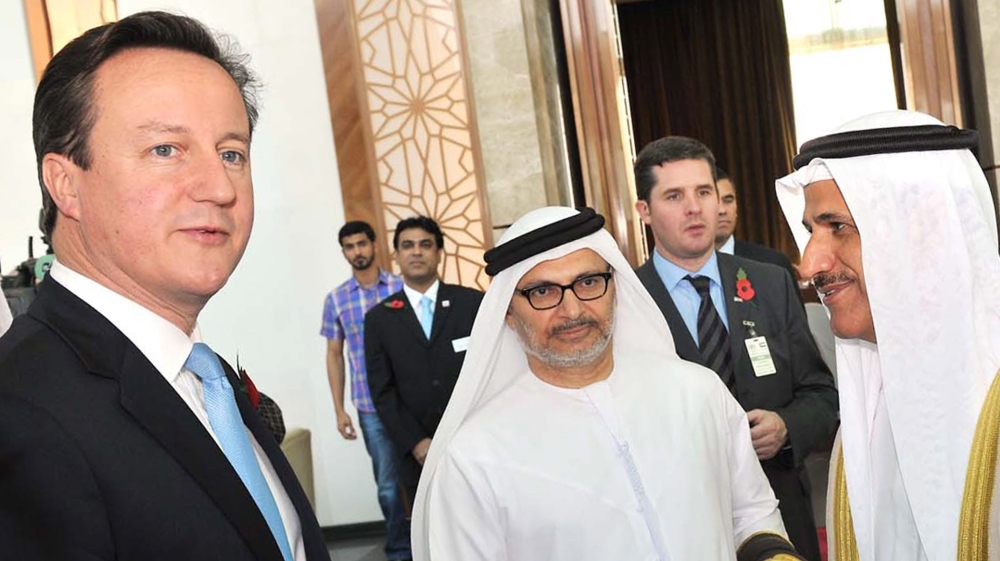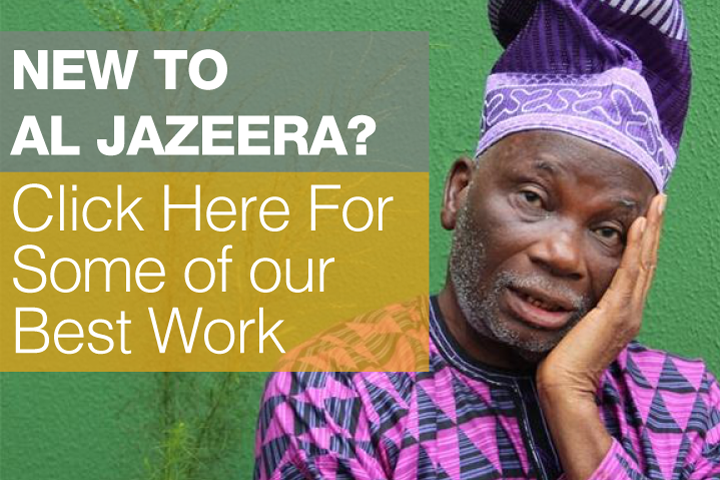Muslim Brotherhood
Activists allege UAE is leading a campaign against the Muslim Brotherhood - and using financial power to get its way.

A
senior member of the Muslim Brotherhood living in the UK told Al
Jazeera his organisation has "nothing to hide" after reports that the
United Arab Emirates had put pressure on the British government to crack
down on the group.
Mohamed Soudan, a former foreign policy adviser to the deposed
Egyptian President Mohamed Morsi, said on Wednesday that if the
government had any proof of wrongdoing, it would have acted against the
group already.
"We never break the law, we don't encourage violence, we want to live in peace and have nothing to hide... They can't do anything because we're doing nothing wrong," Soudan said over the phone.
His reaction came after a report carried by The Guardian newspaper that purported to show that the UAE had promised the completion of a $9bn arms contract if the British Prime Minister David Cameron clamped down on the group, along with other incentives.
Cameron ordered a review into the the activities of the Brotherhood and its alleged ties to extremists in March last year.
The review was completed the following month but its finding have not yet been published, with reports in the British media suggesting it was being suppressed to appease Gulf countries, and Egypt.
Soudan said the delay proved that the British government had no evidence against his organisation and that pressure from the UAE and its Gulf allies had kept the issue going.
"We've seen the leaks in the Guardian, Independent, and others. There is nothing... They [UAE] are using their money to threaten us here," Soudan said.
The UK prime minister's spokesman told Al Jazeera that the British government was "still fully committed to publishing the key findings of the Muslim Brotherhood review".
"We will be publishing those findings by the end of the year... We're not going to speculate on its content in advance," the spokesman said.
INSIDE STORY: Why does the West need Sisi?
The leak to The Guardian is not the first time the UAE has been accused of using its vast financial clout to target the Muslim Brotherhood and affiliated groups.
British-Palestinian activist Azzam Tamimi said that his bank account, along with those of dozens of other individuals and groups linked to the Brotherhood, were shut down by the HSBC bank last year.
"We now know for a fact that the UAE did pressure HSBC to close the banking account of several Muslim individuals and organisations in the UK, including my own and my wife's," Tamimi said, referring to reports that the UAE had influenced banking risk assessments on groups it accused of having ties to the Brotherhood.
Tamimi said the government was making life "increasingly difficult"
for activists who had fallen foul of the UAE, but that the country would
not get its way.
"The UK has a vibrant civil society and a sound legal system that we hope will stand in the way of any despotic tendencies... The UAE rulers thought they just could use their economic leverage to get the UK to do what they wanted."
Abdullah Arian from Georgetown University told Al Jazeera that the UAE's policies against the Muslim Brotherhood could be viewed "in light of a broader regional agenda to suppress opposition movements".
"The continued economic and political situation in Egypt - where the [Abdel Fattah ] el-Sisi regime has proved incapable of restoring stability to the country - has necessitated a continued crackdown on its political opponents by Sisi's regional allies.
"The Muslim Brotherhood's proven ability to survive prior crackdowns has pushed its opponents to pressure other countries to isolate the group and deny its members freedom of movement abroad," Arian said.
RELATED: Muslim Brotherhood sets up shop in London
The UAE was a backer of the July 2013 coup in Egypt that removed the Muslim Brotherhood's Morsi from power, and the crackdown that followed. The country has used its political and military muscle to target supporters of the group in the Middle East and outside the region.
In Libya, leaked recordings appeared to show that the UAE was backing General Khalifa Haftar, a powerful commander supporting the rival government based in the eastern city of Tobruk. It supplied arms to Haftar in his battle against the Tripoli-based administration, which includes the Muslim Brotherhood.
US officials have also accused the UAE of launching air strikes against Tripoli-aligned militias in Libya from bases in Egypt, a charge the Tobruk government and Egypt have denied.
In November last year, dozens of organisations accused of ties with the Muslim Brotherhood were designated as terrorist organisations by the UAE.
The list included several UK-based organisations such as the Federation of Islamic Organisations, Muslim Association of Britain, and the charity Islamic Relief UK, which works with the British government on a number of projects.
A spokesman for Islamic Relief told Al Jazeera it "categorically denied terrorist links and is in the process of challenging its listing through the Emirati courts".
Last month, an investigation by the British newspaper the Mail on Sunday found that the UAE had hired a London-based lobbying firm, Quiller Consultants, to help it mount a media campaign against Qatar, which has been accused by its Gulf neighbours of backing the Muslim Brotherhood.
RELATED: UAE charges Qatari with al-Islah ties
Amnesty International has condemned the UAE for targeting members of the Islah party, which the government claims is affiliated with the Muslim Brotherhood.
In a report published in November last year, Amnesty said Islah members held by authorities had complained of torture, and others were being detained at undisclosed locations without charge or trial.
|
|
"We never break the law, we don't encourage violence, we want to live in peace and have nothing to hide... They can't do anything because we're doing nothing wrong," Soudan said over the phone.
His reaction came after a report carried by The Guardian newspaper that purported to show that the UAE had promised the completion of a $9bn arms contract if the British Prime Minister David Cameron clamped down on the group, along with other incentives.
Cameron ordered a review into the the activities of the Brotherhood and its alleged ties to extremists in March last year.
The review was completed the following month but its finding have not yet been published, with reports in the British media suggesting it was being suppressed to appease Gulf countries, and Egypt.
Soudan said the delay proved that the British government had no evidence against his organisation and that pressure from the UAE and its Gulf allies had kept the issue going.
"We've seen the leaks in the Guardian, Independent, and others. There is nothing... They [UAE] are using their money to threaten us here," Soudan said.
The UK prime minister's spokesman told Al Jazeera that the British government was "still fully committed to publishing the key findings of the Muslim Brotherhood review".
"We will be publishing those findings by the end of the year... We're not going to speculate on its content in advance," the spokesman said.
INSIDE STORY: Why does the West need Sisi?
The leak to The Guardian is not the first time the UAE has been accused of using its vast financial clout to target the Muslim Brotherhood and affiliated groups.
British-Palestinian activist Azzam Tamimi said that his bank account, along with those of dozens of other individuals and groups linked to the Brotherhood, were shut down by the HSBC bank last year.
"We now know for a fact that the UAE did pressure HSBC to close the banking account of several Muslim individuals and organisations in the UK, including my own and my wife's," Tamimi said, referring to reports that the UAE had influenced banking risk assessments on groups it accused of having ties to the Brotherhood.
|
|
"The UK has a vibrant civil society and a sound legal system that we hope will stand in the way of any despotic tendencies... The UAE rulers thought they just could use their economic leverage to get the UK to do what they wanted."
Abdullah Arian from Georgetown University told Al Jazeera that the UAE's policies against the Muslim Brotherhood could be viewed "in light of a broader regional agenda to suppress opposition movements".
"The continued economic and political situation in Egypt - where the [Abdel Fattah ] el-Sisi regime has proved incapable of restoring stability to the country - has necessitated a continued crackdown on its political opponents by Sisi's regional allies.
"The Muslim Brotherhood's proven ability to survive prior crackdowns has pushed its opponents to pressure other countries to isolate the group and deny its members freedom of movement abroad," Arian said.
RELATED: Muslim Brotherhood sets up shop in London
The UAE was a backer of the July 2013 coup in Egypt that removed the Muslim Brotherhood's Morsi from power, and the crackdown that followed. The country has used its political and military muscle to target supporters of the group in the Middle East and outside the region.
In Libya, leaked recordings appeared to show that the UAE was backing General Khalifa Haftar, a powerful commander supporting the rival government based in the eastern city of Tobruk. It supplied arms to Haftar in his battle against the Tripoli-based administration, which includes the Muslim Brotherhood.
US officials have also accused the UAE of launching air strikes against Tripoli-aligned militias in Libya from bases in Egypt, a charge the Tobruk government and Egypt have denied.
In November last year, dozens of organisations accused of ties with the Muslim Brotherhood were designated as terrorist organisations by the UAE.
The list included several UK-based organisations such as the Federation of Islamic Organisations, Muslim Association of Britain, and the charity Islamic Relief UK, which works with the British government on a number of projects.
A spokesman for Islamic Relief told Al Jazeera it "categorically denied terrorist links and is in the process of challenging its listing through the Emirati courts".
Last month, an investigation by the British newspaper the Mail on Sunday found that the UAE had hired a London-based lobbying firm, Quiller Consultants, to help it mount a media campaign against Qatar, which has been accused by its Gulf neighbours of backing the Muslim Brotherhood.
RELATED: UAE charges Qatari with al-Islah ties
Amnesty International has condemned the UAE for targeting members of the Islah party, which the government claims is affiliated with the Muslim Brotherhood.
In a report published in November last year, Amnesty said Islah members held by authorities had complained of torture, and others were being detained at undisclosed locations without charge or trial.
 |
||
| Cameron is said to have come under pressure from Gulf countries to crackdown on their opponents in the UK [EPA] |
Source: Al Jazeera

No comments:
Post a Comment